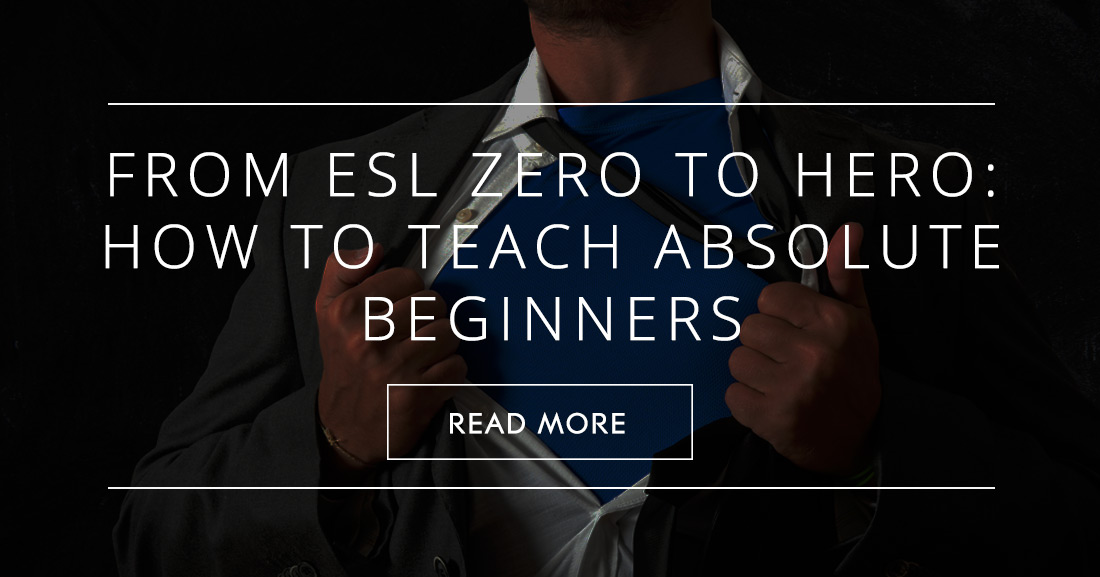Table of Contents
by Claudia Pesce
450,988 views
In today’s globalized world, most beginner ESL students have had some contact with the English language, usually through the Internet, movies or TV.
Many ESL students, often referred to as false beginners, have most likely studied English at some point in their lives and abandoned their studies.. But every now and then, we come across an absolute beginner, someone who has had so little exposure to English, they can’t even handle the most basic greetings, verbs or vocabulary. Whether you are teaching a complete group of absolute beginners, or a few within a group of false beginners, here are some tips that will help your students go from ESL zeroes to heroes! And when you get it right, this class might even be your most rewarding one.

How To Teach Absolute Beginners
-
1
Prioritize Learning Goals
Absolute beginners have had so little exposure to the English language, they have absolutely nothing to build on. Naturally, you’ll start with the basics, but consider what they’ll need to know first. Does it make sense to start with a list of foods in English? Or colors or numbers? Probably not. What they need to know first is how to introduce themselves and greet others. The natural progression from there is the use of the verb “to be” (I am from…; He is from…, etc…). Then you’ll progress on to possessives (my country, your name, his family) and so on…Give priority to the language they will need first and foremost.
-
2
Don’t Assume Anything
Don’t make assumptions about what your students might or might not know. Rather assume they know nothing. For example, to practice the verb to be, you ask them what nationality they are, only to find out they don’t know how to say nationalities in English. Countries and nationalities should be taught first, and then practiced with the verb “to be”. And this goes for a multitude of vocabulary and expressions. Don’t assume a student will be able to answer you if you ask, “How are you?” Absolute beginners won’t know how to reply, unless you’ve specifically taught them.
-
3
Celebrate Small Achievements
Absolute beginners will tell you they don’t speak English – till the very end of the course. What they’re thinking is that they don’t speak English fluently, or like you, for example. But make sure they’re aware of what they can do. If on the first day of class they’ve learned to greet each in English, end your lesson by celebrating this, “Congratulations! You can now introduce yourself and greet each other in English”. Take the focus away from what they can’t do and focus on what they can do instead. This proves to be tremendously encouraging!
-
4
Use Their Senses
Absolute beginners may not have enough knowledge to understand explanations, synonyms, definitions, i.e. anything you describe with words. Instead, use their senses to maximize learning. Visual aids like flashcards are the easiest to use with beginners are visual aids like flashcards, but don’t’ forget to include plenty of gestures, as well as real life objects. The use of realia will allow you to utilize several senses at the same time, and it’s often more engaging than two-dimensional pictures. Don’t forget to use things they can smell and taste, too!
-
5
Show, Don’t Tell
Because they haven’t been exposed to the English language enough, try to minimize their reading of dialogues and conversations, and act out the situations, instead. Consider this: when you teach students to reply to a “How are you?” do you have them read this short exchange first or just act it out directly? Of course, it’s a lot better to simply show them how to reply. This goes for most of the expressions and functions they will have to learn.
-
6
Build on What They’ve Learned Before
It is essential for absolute beginners to review what they’ve previously learned, and it’s a great idea to start each lesson with a brief review. But you can also re-use previously taught language points and introduce them into a new context. Say you are now teaching your students how to ask for directions. Student A is walking down the street with a friend, Student B, when they run into Student C. A introduces B to C (they review how to introduce someone), and then C asks A for directions.
-
7
Keep It Real
Just because students are absolute beginners, it doesn’t mean they can’t handle real life situations. You should still teach in context, and provide as many examples of real life situations and real props as you can. Even though real maps, brochures or catalogues are filled with vocabulary they won’t understand, it is important to help your absolute beginners deal with, precisely, these types of things. Show them how to pinpoint the information they may need like a phone number, address or website. Make sure they understand that it doesn’t matter that they can’t read the entire brochure, the important thing is that they learn to obtain what they need from it.
-
8
Talk about something familiar
There will be cultural differences among your beginner students. Discussing subjects that are less challenging to them can help break the ice, provide subject matter that is familiar to them, and at the same time promote tolerance and harmony. Describing where they come from, relating how they spend their holidays and celebrate cultural and family occasions are helpful ways to encourage learning and speaking practice.
Five Tips for teaching English to absolute beginners
- Keep things simple and make your instructions clear.
- Don’t use complicated words and terms.
- Keep things clear by using visual aids like flashcards, diagrams, pictures.
- Be patient and give them lots of encouragement.
- Introduce fun activities.
- Drilling is useful to reinforce new language and pronunciation, promote good speaking habits and become familiar with new words.
By the time your absolute beginners finish their course, they will probably still not feel confident enough to say they “speak” English. That’s OK. The idea of “speaking English” is too vague in this context.
Try providing them with some specific examples of what they can do now: go shopping by themselves, ask for assistance, order food in a restaurant, etc… Ask them to remember what it was like when they knew none of this. Tell them they are your heroes for learning so much and overcoming their language barriers. They will feel like heroes, too!
Have any more tips for teaching absolute beginners? Share! Share! Share them below!
P.S. If you enjoyed this article, please help spread it by clicking one of those sharing buttons below. And if you are interested in more, you should follow our Facebook page where we share more about creative, non-boring ways to teach English.

Get the Entire BusyTeacher Library:
Dramatically Improve the Way You Teach
Save hours of lesson preparation time with the Entire BusyTeacher Library. Includes the best of BusyTeacher: all 80 of our PDF e-books. That’s 4,036 pages filled with thousands of practical activities and tips that you can start using today. 30-day money back guarantee.
Learn more






More Stories
How to write creative assignments using Paraphrasing Tool?
FVHS receives AP Computer Science Female Diversity Award
File Management Skills for SAM Success